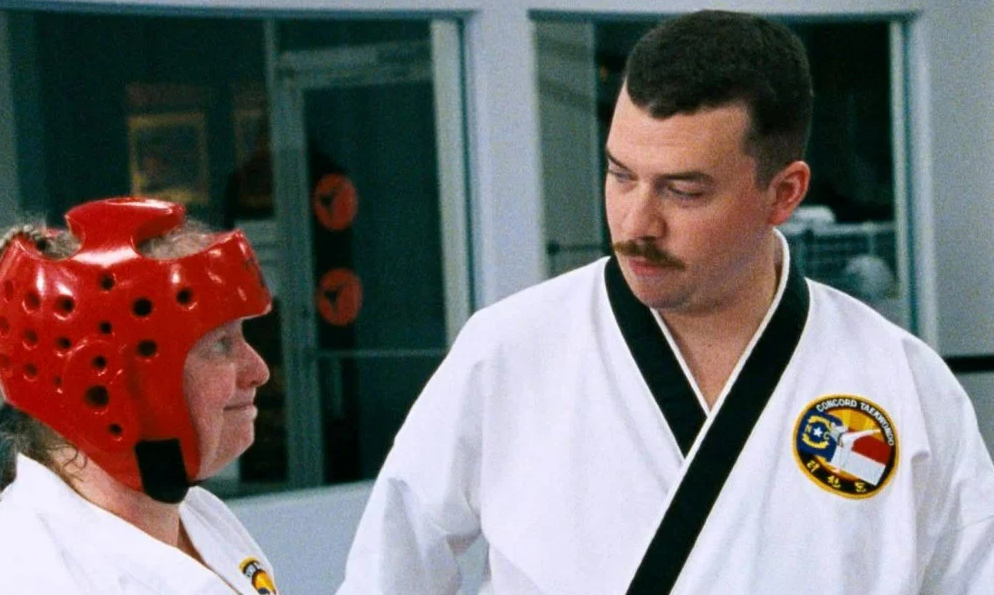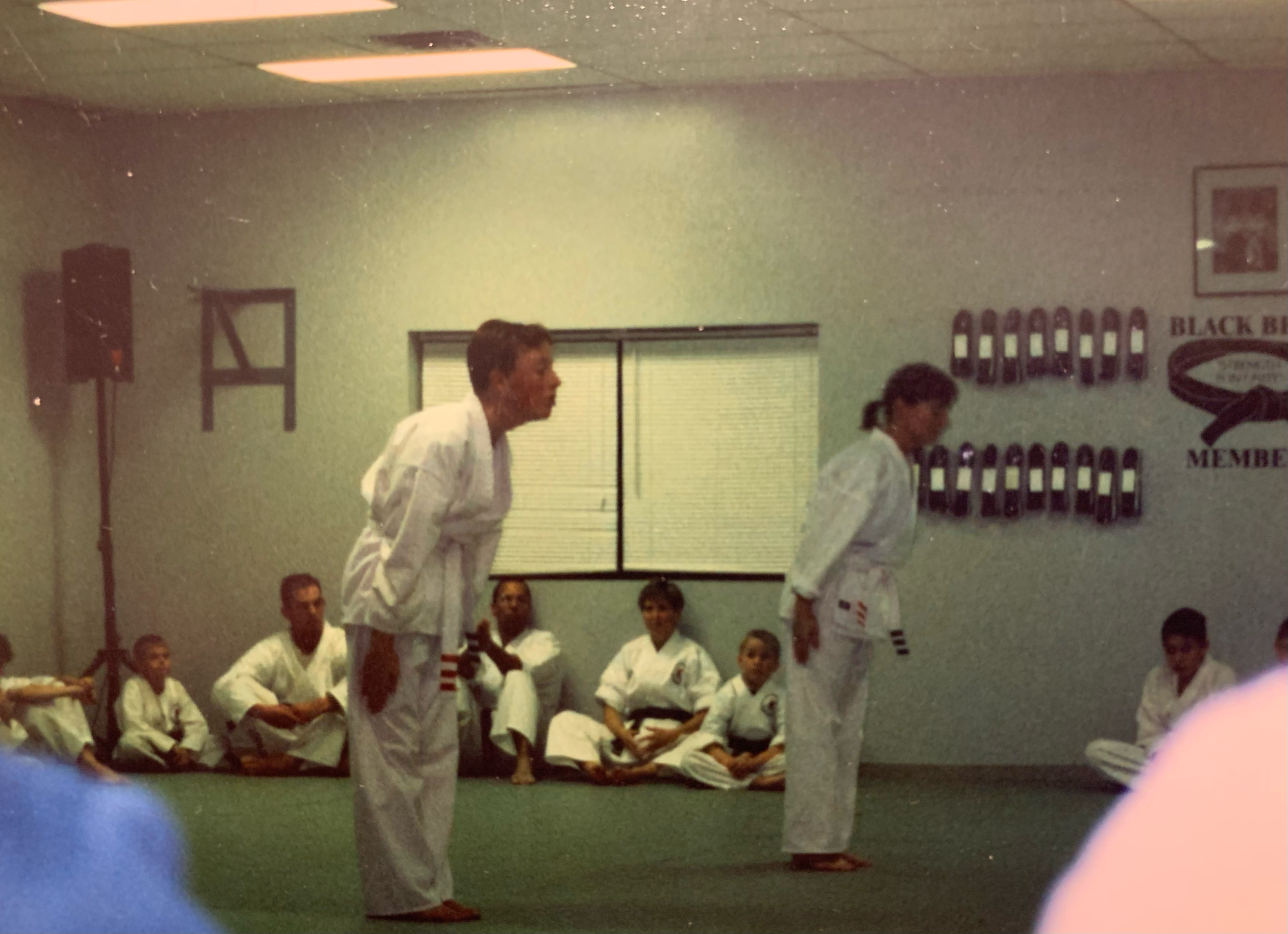Test Obituary no. 1

The Importance of Jump Kicks
*The Foot Fist Way (2006)

In order to successfully perform a jump kick, you need to commit. The same is true of comedy. The Foot Fist Way, Jody Hill’s 2006 man-child coming of age film starring his pal Danny McBride, understands both of these principles. The cringe-inducing character study follows martial arts instructor Fred Simmons (McBride) as he balances running a taekwondo studio with his wife’s infidelity and the pain of learning his hero, Chuck “The Truck” Wallace (Ben Best), is a piece of shit. Like all of McBride’s work, the laughs come from a tragic immaturity which produces filthy jokes and social embarrassment, and those elements work because of the parts of the film’s world that feel off limits from mockery.
Structured around the principles of black belt—modesty, courtesy, self-control, perseverance, and indomitable spirit—the film contrasts the foolishness of its main character with what seems like a genuine love of martial arts. As a lifelong martial artist and former karate instructor, I am aware of how silly this kind of stuff can look to the uninitiated, with its white uniforms, yelling, and practice fighting. Famously, The Office (US) made karate a punchline in its second season episode “The Fight,” and that always stung because I find Jim Halpert loathsome. So I felt a deep appreciation that Hill (himself a black belt), so confidently depicted real martial arts students in his movie and made jokes around them instead of at them.
That confidence to resist easy ridicule and show something like martial arts with sincerity has followed Hill and McBride through their careers, and it’s enabled them to create transcendent moments in their subsequent work with collaborator David Gordon Green. Most notably this is on display in The Righteous Gemstones, a satire of American megachurches that doesn’t mock religion and commits to major action set pieces, like a famous sequence in which prodigal son and former stuntman Gideon Gemstone confronts an army of motorcycle ninjas. In both cases, the creators play it straight in order to access a rare level of comedy: awesomeness. It's that feeling where your expectations of failure have been subverted to such an extent that all you can do is laugh at the glorious aptitude of a person you thought was a fool. Victory when you least expect it.
The End is Not the End
†Thee Black Boltz – Tunde Adebimpe (2025)
After what seemed like a collective campaign from elder millennials to manifest a TV on the Radio reunion, the Brooklyn band is back together for a tour celebrating the 20th anniversary of their debut, Desperate Youth, Blood Thirsty Babes. And while they didn’t record an album to accompany the festivities, one of the group’s singers, Tunde Adebimpe, released his first solo record on Friday, and that’s just as good.
Thee Black Boltz is an eclectic showcase of Adebimpe’s talent and imagination. The manic anthem “Magnetic” sweeps naturally into the heavy fairytale vibes of “Ate The Moon,” while the cool nightmare dirge “Blue” evokes early TVOTR, and “The Most” dials up the experimentation—reminding me of mid-career Jack White as it samples the sound of a car crash. The whole affair finishes after 35 minutes of luminous, genre-shifting indie rock. But for all the fun, highly orchestrated antics, the soul of the record resides in the acoustic ballad “ILY.” A straightforward love song isn’t easy to pull off these days, 65 years after The Beatles made it kind of cliché, but Adebimpe is among his generation’s best indie rock vocalists, and giving himself the space to just drop in and express the track’s title acronym is a gift. Every time Adebimpe commits to the L-bomb, I feel like I remember why the word is so powerful in the first place.
Until It's Over (Never)
‡Eternity

Professional writers are each responsible for their family’s obituaries. It’s a rite that I accepted only a few weeks ago when my mother died. Her breast cancer, which had been in remission, returned in her liver. Dealing with the doom and pain of her illness, and the various failed attempts to rescue her from it, I experienced my first ever serious bout with writer’s block this past winter. Anticipating that block as an obstacle to mom’s final draft, I started writing the obit on pen and paper as I sat vigil next to her hospital bed, writing in the back of the notebook I’m using to compose my next essay collection. And I did have trouble, listening to the rhythm of her breathing, writing a summary of my mother’s life. She was still alive. That’s why I was there. It wasn’t time.
After she passed, I threw away those initial notes and let the words flow. The experience was gratifying. Feeling so helpless during her decline, I was finally able to do something of value: I could help everyone understand why she was so important. Writing was easy again. I’m a critic and my mom ruled. I was able to give her a perfect review. 10/10. Five stars. Two thumbs way up.
Writing an obituary is cathartic and wholly satisfying. But having the final say got me thinking about why I needed mom’s death to happen before writing about her life. I think it’s because, for me, writing needs to come from a place of sincerity. I can’t just pretend a life is over in order to shortcut grief and save time at the keyboard.
But can I transpose that finality onto my daily writing practice? I write about art, and art isn’t a person. It doesn’t die. Art is a mirror. When we write about art, we are writing about ourselves. And we are always changing. We are still alive. We can’t understand something until it’s over, and for us, it’s never over. That’s why I made this place where I can give myself permission to try things out, practice committing to ideas, and say things that are meaningful to me now, even if they might have been said better before, or make better sense when I get closer to the end.
Welcome to Test Obituary.
PETER COUNTER is a culture critic writing about television, video games, film, music, and technology. He is the author of Be Scared of Everything: Horror Essays and How to Restore a Timeline: On Violence and Memory.